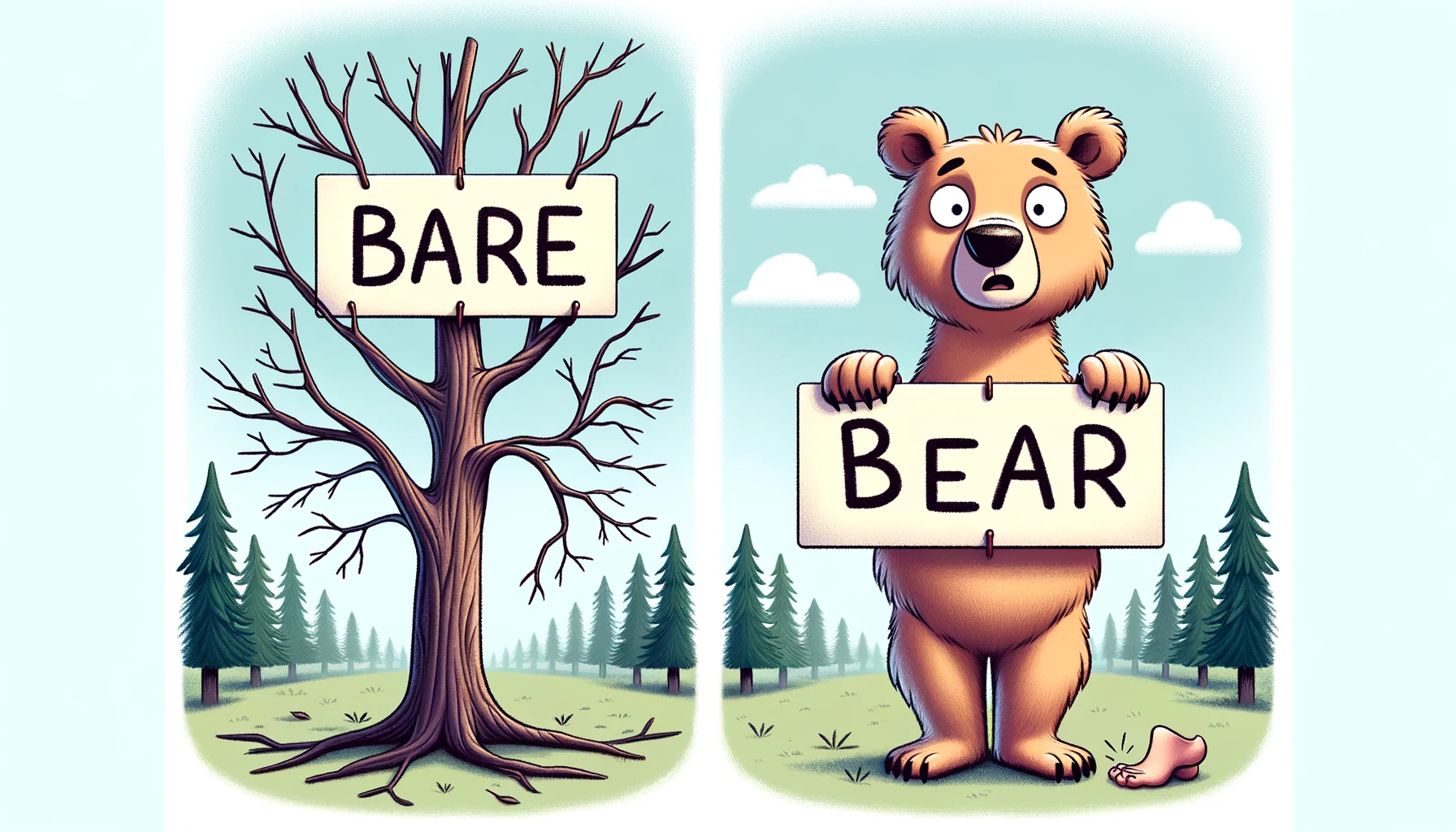
Editly Etymology: bare vs bear
The editing experts at Editly have become masters of commonly confused words over the course of their careers as editors, proofreaders, and humanizers. In Editly Etymology, they tap into their own experience to offer a closer look into the horrifying beauty of the English language. This installment investigates a pair of words that are both near and far: bare vs bear.
Bare Definition
This adjective means lacking a usual covering.
Bear Definition
As a noun, it refers to the majestic animal.
Did you catch that? Just to make sure, let’s ask AI to help us generate a visual representation of each of the words.
Bare = lacking covering.

Bear = animal.

Bonus* = a bare bear.

Bare Root
Old English, of Germanic origin, from an Indo-European root.
Bear Root
Old English, of Germanic origin, from an Indo-European root.
Who is to Blame for this Confusion?
While the Germans are suspects in this case, they have an alibi of sorts with the fact that the roots of both words stretch back much further.
AI Text on Bare
The word "bare" has an interesting etymological history, tracing back to Old English and even earlier Indo-European roots.
- Origin in Old English: The word "bare" originates from the Old English word "bær," which means "naked, uncovered, or without clothing." This usage reflects the primary modern sense of the word as lacking coverage or devoid of the usual contents.
- Proto-Germanic Roots: The Old English "bær" comes from the Proto-Germanic word "*bazaz," which likely had a similar meaning related to being naked or uncovered. This Proto-Germanic root is also the ancestor of similar words in other Germanic languages, such as Old High German "bar" and Old Norse "berr," both carrying similar meanings.
- Indo-European Connections: Going further back, the Proto-Germanic "*bazaz" is derived from the Proto-Indo-European root "*bhos-o-," which is linked to various words in different Indo-European languages associated with nakedness or a lack of coverage.
- Semantic Evolution and Usage: Over time, the meaning of "bare" has broadened and varied slightly in English. Aside from its primary meaning related to nakedness or exposure, "bare" has developed figurative uses, such as "bare facts" (the plain truth without embellishment) or "bare minimum" (the least amount necessary).
The historical progression of "bare" from ancient linguistic roots to its modern uses demonstrates how languages evolve and words adopt new meanings while retaining echoes of their original forms. (224 words)
Humanization of AI Text on Bare
The word "bare" has an interesting etymological history.
- Origin in Old English: The word "bare" originates from the Old English word "bær," meaning "naked, uncovered, or without clothing."
- Proto-Germanic Roots: "Bær" comes from the Proto-Germanic word "*bazaz," which likely had a similar meaning related to being naked or uncovered.
- Indo-European Connections: The Proto-Germanic "*bazaz" is itself derived from the Proto-Indo-European root "*bhos-o-," which is linked to various words in different Indo-European languages.
- Semantic Evolution and Usage: Over time, the meaning of "bare" has varied slightly in English. Aside from its primary meaning related to exposure, "bare" has developed figurative uses, such as "bare facts" (the plain truth) and "bare minimum" (the least amount necessary).
The historical progression of "bare" demonstrates how words adopt new meanings while retaining strong echoes of their original forms. (137 words)
Result of Changing the AI Text to Human Text
The humanized text is more direct and engaging, as it offers the necessary information in a much more direct fashion without unnecessary repetition. In fact, the human text has reduced the number of words from 224 words to 139 words—or by nearly 39%—without losing any of the text’s main ideas.
AI Text on Bear
The word "bear" in English has a rich history, particularly when discussing the animal. Here's a look into its etymological background and historical usage:
- Old English Origins: The English word "bear" comes from the Old English "bera," which is directly related to the name of the animal. This term has been in use in English since before the 12th century.
- Proto-Germanic Roots: "Bera" in Old English traces back to the Proto-Germanic "*berô," which also referred to the bear. Words similar to this exist in other Germanic languages, such as Old High German "bero" and Old Norse "bjǫrn," indicating a common Germanic lineage.
- Indo-European Connections: Going further back, "*berô" is believed to be from the Proto-Indo-European root "*bʰer-", meaning "bright brown" or perhaps "shining," which might refer to the shiny fur of the bear. This connection, however, is somewhat speculative, and the precise etymology remains a topic of scholarly debate.
- Avoidance of True Name: A fascinating aspect of the word "bear" is the widespread historical practice among many Indo-European-speaking peoples of using euphemisms for the actual name of the bear, likely due to superstitious reasons (e.g., fearing to attract the animal by naming it directly). This practice led to the development of terms like "bear," which means "the brown one" in many languages, serving as a descriptive rather than a direct name. The original Proto-Indo-European term for the bear (*rkto-) survives in distant relatives like the Greek "árktos" and the Latin "ursus."
- Cultural Impact: The bear has been a significant figure in the mythology and folklore of various cultures, influencing not just language but also stories and symbols throughout history. In English, "bear" also extends metaphorically in verbs like "bearing" (carrying or enduring), showing how the attributes of the animal have been woven into various expressions and meanings.
Thus, the word "bear" encapsulates a blend of linguistic evolution, cultural superstitions, and symbolic significance, highlighting how language and societal beliefs intertwine. (324 words)
Humanization of AI Text on Bear
"Bear" has a rich history, particularly when discussing the animal. Here's a look into its etymological history:
- Old English Origins: "Bear" comes from the Old English "bera," which has directly related to the name of the animal since before the 12th century.
- Proto-Germanic Roots: "Bera" traces back to the Proto-Germanic "*berô," which also refers to the bear.
- Indo-European Connections: Further back, "*berô" is believed to be from the Proto-Indo-European root "*bʰer-", meaning "bright brown" or perhaps "shining," which some scholars argue might refer to the bear’s shiny fur.
- Avoidance of True Name: A fascinating aspect of "bear" is the historical practice among many Indo-European-speaking peoples of using euphemisms, likely due to superstitious reasons (e.g., fearing to attract the animal by naming it directly). This practice led to the development of terms like "bear," which means "the brown one" in several languages, serving as a descriptive rather than a direct name. The original Proto-Indo-European term for the bear (*rkto-) survives in distant relatives like the Greek "árktos" and the Latin "ursus."
- Cultural Impact: The bear has been a significant figure in the mythology and folklore of various cultures, influencing not just language but also stories and symbols throughout history. In English, "bear" also extends metaphorically in verbs like "bearing" (carrying or enduring), showing how the attributes of the animal have been woven into various expressions and meanings.
Thus, "bear" encapsulates a blend of linguistic evolution, cultural superstitions, and symbolic significance, highlighting how language and societal beliefs intertwine. (251 words)
Effect of Humanizing the AI Content
Humanization has affected the AI text significantly, making it more concise through better diction (word choice) and the elimination of repetition. This concision can be measured mathematically, as humanization has reduced the word count from 345 words to 224 words—or by nearly 23 percent.
Whether it’s for bare or bear, the best AI humanizer does, in fact, turn out to be a human. So, if you need any help to humanize your AI content, don’t wait to get started on Editly.


Paul S.
Online editing, proofreading, and rewriting for both human and AI text. Specialties include admissions essays, academics, business, blogs, and ChatGPT to human text. Chief editor at Editly AI.